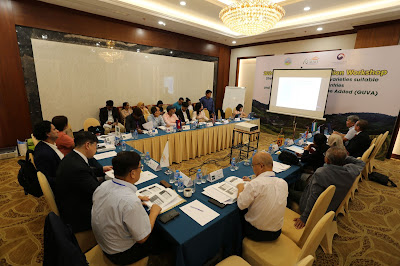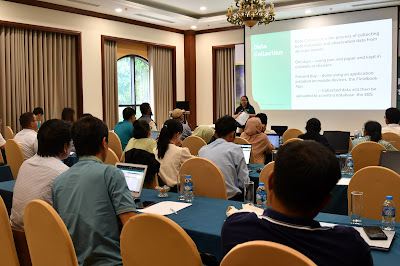The 2024 AFACI (Asian Food and Agriculture Cooperation Initiative) assessed the progress of the project, "Stress-tolerant, high-yielding rice (SHR) varieties suitable for AFACI member countries and Germplasm Utilization for Value Added (GUVA)" during their Project Evaluation Workshop from August 27 to 28, 2024. The reviewed initiative aims to develop rice varieties resilient to biotic and abiotic stresses like drought, salinity, and flooding while enhancing yield potential.
The workshop commenced with remarks from representatives of the Vietnam Academy of Agricultural Sciences (VAAS), Korea Program on International Agriculture(KOPIA), Global Forum for Rural Advisory Services (GFRAS), Asian Food and Agriculture Cooperation Initiative's (AFACI), and IRRI, followed by participant introductions, fostering a collaborative spirit. Key discussions focused on the "Trends in the Rice Industry in Asia" and “Vietnam’s Rice-Related Policy Trends.” These discussions sought to address the need for innovative research and policy support in improving rice production.
The event also showcased the progress and challenges of each member country in implementing the SHR and GUVA projects, followed by interactive Q&A sessions. Insights from country presentations culminated in a discussion and a summary session led by AFACI, focusing on strengthening future collaborations. Relevant to the talks, the participants also visited the VAAS experimental research station, which provided an opportunity to observe Vietnam’s ongoing research efforts and discuss strategies for rice production improvement and resilience across the region.
Following the evaluation workshop was the Enterprise Breeding System (EBS) training by the IRRI team on August 29-30, 2024, a hands-on training in digitized data collection. The training comprised a review of trial protocols and a comprehensive introduction to the EBS Experiment Manager Tool. Participants learned to upload mapping files, record tasks, and navigate the Fieldbook App for accurate data entry. They also engaged in a Fieldbook Simulation, gaining practical experience with the EBS system and ensuring effective breeding trial data management.
After the in-person training, a virtual training followed using the Bioflow Software for Data Analysis, held on September 2-3, 2024. Bioflow facilitates understanding evolutionary forces—mutation, gene flow, migration, and selection—by integrating various data sources for biometrical genetics analysis. This virtual training equipped scientists and researchers to perform sophisticated genetic evaluations efficiently. Bioflow's database-agnostic design allows seamless data retrieval from systems like EBS, BMS, BreedBase, GIGWA, and NASAPOWER, enhancing researchers' capacity to analyze large datasets and make informed breeding decisions.
The AFACI Project Evaluation Workshop, EBS, and Bioflow Trainings ended successfully, offering valuable opportunities for knowledge exchange, capacity building, and practical training. With support from modern technologies like EBS and Bioflow, AFACI member countries are poised to develop and disseminate stress-tolerant, high-yielding rice varieties, addressing the challenges of climate change and ensuring food security for millions across the region.
The events, organized by IRRI’s Rice Breeding Innovations Department on Product Development and Variety Replacement South East Asia (PDVR-SEA) Team, headed by Dr. Mary Jean Du, in collaboration with the Rural Development Administration (RDA) and AFACI, were hosted by the VAAS, gathering rice research experts from 10 AFACI member countries: Bangladesh, Cambodia, Indonesia, Laos, Nepal, Philippines, Sri Lanka, Thailand, Uzbekistan, and Vietnam.
###
Learn more about IRRI (www.irri.org) or follow us on social media and networks (all links down the right column).





No comments:
Post a Comment